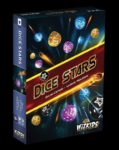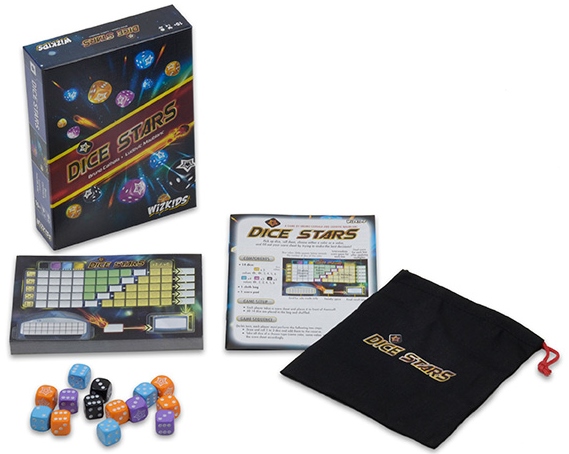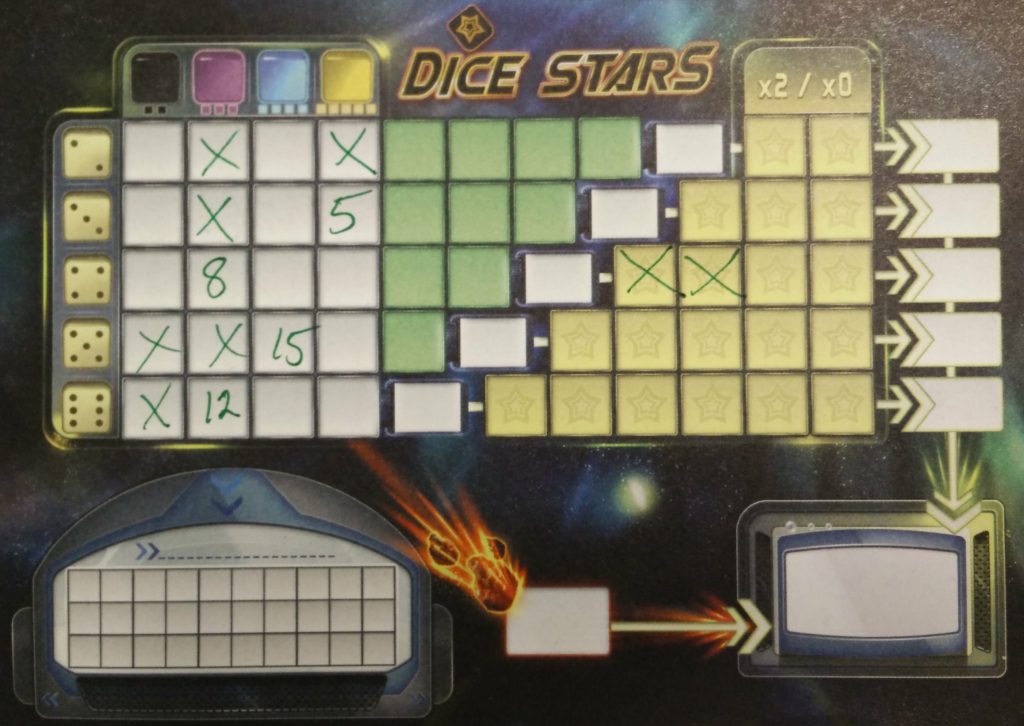Dice Stars (Boardgame)
 In Dice Stars, players choose dice from a common pool to best fill in their scorepad. Choosing stars is important as they can double or zero out sections of your score. Players roll dice into a common pool and then choose sets of dice in the pool to score on their pad. A quick, 20 minute game provides players with interesting choices to mitigate luck and provide strategic play, while still providing some of the highs and lows of a dice-based game.
In Dice Stars, players choose dice from a common pool to best fill in their scorepad. Choosing stars is important as they can double or zero out sections of your score. Players roll dice into a common pool and then choose sets of dice in the pool to score on their pad. A quick, 20 minute game provides players with interesting choices to mitigate luck and provide strategic play, while still providing some of the highs and lows of a dice-based game.
Dice Stars
Publisher: Wizkids
Ages: 10+
Players: 1-4
Time: 20 minutes
(Review copy provided by Wizkids)

Dice Stars consists of a set of 2 black, 3 pink, 4 blue, and 5 yellow dice. Each die has a star in place of the number 1 side. Players start their turn by taking one to three dice from the bag, rolling them, and adding them to the community pool. (If the pool is empty they must choose to roll three dice.) Once rolled, players choose a set of dice from the central pool. They can choose one of the following.
- Choose all numbered dice of one color. For each die selected an X is added to that color’s column on the scoresheet, with the last “X” replaced by the sum of the dice. Used dice are put in the discard pool.
- Choose all numbered dice of one value. For each die selected, an X is added to that row of of the scoresheet, with the last “X” replaced by the sum of the dice selected. Used dice are put in the discard pool. Players may need to fill in the green bonus section, which are treated the same as the white spaced but they cannot be filled by selecting dice color.
- Choose all dice showing stars. For each die selected, one star spot is crossed out on the scoresheet.
If stars are chosen, or a player has taken the last dice in the bag, the next player must take all the discarded dice, and (optionally) dice in the center pool and put them back into the dice bag.
If a player manages to fill in their last white space, the game ends after all players have had an equal number of turns. If one player rolls and finds that they no longer have a legal play, they must still select a set of dice as before, but the total is now written in their penalty space. This also ends the game once all players have had an equal number of turns.

Fortunately, the scoring phase of the game is interesting but not overly complex. Players add up all the numbers in a row (ignoring X’s) and then check the star boxes in that row. If they filled in no star boxes in that row, their score is simply the total for that row. If they manage to fill in all the star boxes in that row, their score is doubled. However, if only some of the star boxes are filled in that row that row scores zero points. Players add all their row scores and subtract penalty points if they have them. Highest total wins the game!
An option for solo play is included. Play is as before, but players must check off boxes (on the bottom left of the scoresheet) for points remaining in the dice pool at the end of each turn. Leaving both starred and numbered dice in the pool forces players to take a double-penalty (preventing one from building up large numbers of stars before removing them from the field. I found the solo experience mildly enjoyable. However, the game loses some of its entertainment value since some of the best parts of the game are when players celebrate (or lament) particularly good or bad rolls.
Verdict
As a fast playing, portable dice game, Dice Stars is a fun little diversion. Having players choose from a common pool of dice helps to mitigate luck although it can still play a part, especially since there is no rerolling. The common dice pool also tends to keep the attention of other players. While there is nothing officially to do on another player’s turn, players watch the common pool carefully as they will be choosing from the pool soon enough. Simply choosing whether to roll one, two, or three dice is another decision in the game. I tend to roll three dice each time until the end game where I want to be sure I don’t have to select too many dice at once. The stars also add a bit of tension. Do I fill in some of the shorter rows and know I can double my score or do risk it and go for a longer row and try to double a higher number of points? The endgame can become a bit dangerous with many dice in the pool as a player may be forced to add in one more star than they want, wiping out the score of an entire row. With colorful dice and scorecards, simple instructions, and a portable game setup, Dice Stars is a good little option for a quick game on the go.
Kid Factor
The game is easily playable by kids under 10. The gist of the scoring is easy enough to understand, even if one is not particularly strategic in their choices. The game has enough math addition (and multiplying by two) to provide a bit of practice for early grade schoolers. Of course, a parent of a particularly young child could simply add up all the scores at the end of the game. As a parent of competitive boys, I appreciate that there is no direct competition. However, since there is no direct way to penalize other players, so while some may feel this forces the game into somewhat of a solitary experience. As it stands, it makes a fine game for families. It is accessible by younger players but also provides significant decisions for the older players.





Discussion Area - Leave a Comment